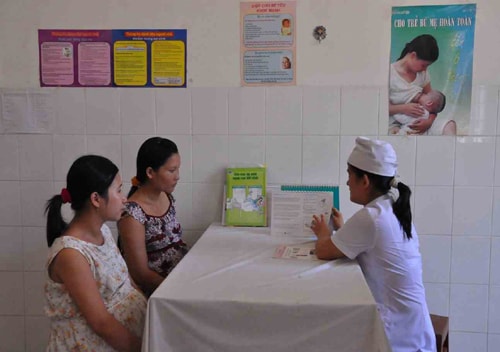Pregnant, what to eat to be healthy?
During pregnancy, the mother needs to be provided with adequate energy and nutrients.
Diet requires increased energy: During pregnancy, in addition to the mother's energy needs, energy must also be provided for the development of the fetus, especially in the last 3 months (2,550Kcal/day), so the energy increases by 350 Kcal more than normal people each day (about 1 full bowl of rice).

Supplementing protein and fat: In addition to eating enough rice (and other foods), meals for pregnant mothers need to have foods to supplement protein and fat to help build and develop the baby's body. First of all, it is necessary to pay attention to protein sources from plant foods such as soybeans, green beans, other beans, sesame and peanuts. These are foods with high protein content, but also high fat content, helping to increase meal energy and help absorb sources well.vitaminsoluble in oil
Animal protein is notably from seafood such as shrimp, crab, fish, snails... and if possible, try to have more meat, eggs, milk... Protein needs for women in the last 3 months of pregnancy: 70g/day (high quality protein from meat, fish, eggs equivalent to the following: 100g pork, 150g fish or crab, add 100g peanuts, 1 egg/day is enough...). If possible, mothers should drink additional milk (400-500ml), preferably maternity milk or soy milk.
When pregnant, mothers shouldDHA supplement, an unsaturated fat necessary for the development of the nervous system, especially vision. Pregnant mothers who supplement DHA can help strengthen their baby's immune system and help them fight colds. DHA is abundant in fish oil, fish and seafood. Some current maternity milk products also contain DHA.
Mineral supplements
Minerals and trace minerals are micronutrients that are needed in small amounts but play important roles.
Calcium: During pregnancy, in addition to the normal calcium needs for body functions and to help strengthen bones, the mother needs more calcium to provide the fetus with bone and tooth buds. The mother's body needs twice as much calcium as normal (1,000 mg/day). The larger the fetus, the more calcium it requires. If the mother's body cannot meet the needs, it will fall into a state of calcium deficiency. Therefore, in eating, pay attention to foods rich in calcium and phosphorus such as shrimp, crab, fish, eggs, cheese, milk, legumes, green vegetables, etc.
Iron: During pregnancy, a mother with iron deficiency anemia will have many negative effects on the fetus, possibly causing miscarriage, premature birth, low birth weight and obstetric complications such as postpartum bleeding. The source of iron from the mother's body will be passed on to the baby, which not only improves the mother's health but is also an effective way to prevent iron deficiency anemia in children early in the fetal period. Iron is abundant in meat, fish, eggs, mollusks, cereals, beans of all kinds and sesame, peanuts. Iron provided by food often does not meet the increased iron needs during pregnancy. For this reason, pregnant mothers need to take iron supplements under the guidance of a doctor.
Zinc: Zinc is involved in many important metabolisms in the body. Pregnant women need 10-20mg of zinc per day. The best sources of zinc are meat, fish, especially seafood. Plant foods also contain zinc, but the content is low and more difficult to absorb.
Supplement vitamins
Special attention should be paid to vitamins A, D, B1 and folic acid, these vitamins are necessary for the normal metabolic functions of the body, and participate in the process of building cells and tissues, they also help prevent constipation.
Vitamin A: Pregnant women need to ensure adequate vitamin A throughout pregnancy. After giving birth, the mother needs enough vitamin A to provide vitamin A to her baby through milk. Milk, liver, eggs... are sources of animal vitamin A, which is easily absorbed and stored in the body for later use. Green vegetables, especially spinach, water spinach and yellow and red fruits and vegetables such as carrots, papaya, mango, pumpkin are foods rich in carotene, also known as provitamin A, which is converted into vitamin A in the body.
Vitamin D: Vitamin D helps in the absorption and metabolism of calcium and phosphorus minerals. During pregnancy, if the body lacks vitamin D, it can easily cause consequences such as rickets in the womb because only about 20% of calcium in food is absorbed. Vitamin D requirement 200 IU/day
Vitamin B1: Vitamin B1 is essential for carbohydrate metabolism. Cereals and legumes are good sources of vitamin B1. To get enough vitamin B1, you should eat rice that is not too refined, rotten, or moldy. Eating lots of beans is the best way to supplement enough vitamin B1 for the body's needs and prevent beriberi.
Folic acid (B9): necessary for the development of the fetus's central nervous system, especially in the first weeks. A deficiency can cause neural tube defects. During pregnancy, the mother's body needs B9 many times more than normal, while the body cannot store this nutrient, so it needs to be supplied regularly. Vitamin B9 is abundant in large, dark green vegetables such as: Malabar spinach, kale, chrysanthemum greens, peanuts, chestnuts...
In addition, some other vitamins such as vitamin C increase the body's resistance, support the absorption of iron from food, contributing to the prevention of iron deficiency anemia. Vitamin C is abundant in ripe fruits and green vegetables. Vitamin C is easily lost during the cooking process, so ripe fruits, fruit juices, and green vegetables will be important sources.
According to Health & Life - NT






